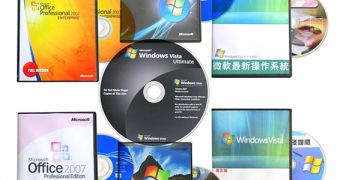Craig Mundie, Microsoft Chief Research and Strategy Officer and one of the two successors of Bill Gates along with Ray Ozzie, Chief Software Architect, revealed his perspective over the worldwide anti-piracy efforts, with a special focus on developing markets. Mundie expects by no means a quick fix to the piracy problem and made it clear that he expects Microsoft to be in the trenches for decades to come. The real issue is with emerging economies that prove to be markets where the software piracy phenomenon not only nestles but also digs in its roots. Mundie was referring especially to Asian markets where piracy of its own products is as high as 80% and even 90%.
Microsoft, however is not ready to throw in the towel. Mundie stated that the Redmond company will work closely with the governments in emerging economies in order to set up legislative measures and to enforce anti-piracy efforts designed to reduce the volume of the practice. Still, in Mundie's view it will take at least one decade or even two in order to make any real progress on emerging markets against piracy. Due to the lobbying Microsoft has delivered so far, the legislative infrastructure exists in Asian economies, but Mundie stressed the fact that the same is less valid on the enforcement side.
With its latest lineup of product, Microsoft has built in anti-piracy mechanisms into the fabric of its main cash cows. Both Windows Vista and the Office 2007 System are intimately connected with the Windows Genuine Advantage and the Office Genuine Advantage, integer parts of the company's strategy to tackle counterfeit software. Microsoft is of course going after the producers of bootlegged software products, aiming to put an end to the underground economy dealing with pirated materials and not after the end users. As a matter of fact, the Redmond company considers end-users of pirated products victims, but also regards them as potential customers.
One recent move from Microsoft indicated that neither legislation and its strong enforcement, nor the WGA and OGA contributed to reducing software piracy in China. The Chinese Public Security Bureau (PSB) together with the FBI and with help from the Redmond company did manage to take down a $2 billion Microsoft counterfeit software syndicate and the WGA did provide valuable information. But in the end the price of Windows Vista was dropped by more than 50%.

 14 DAY TRIAL //
14 DAY TRIAL //